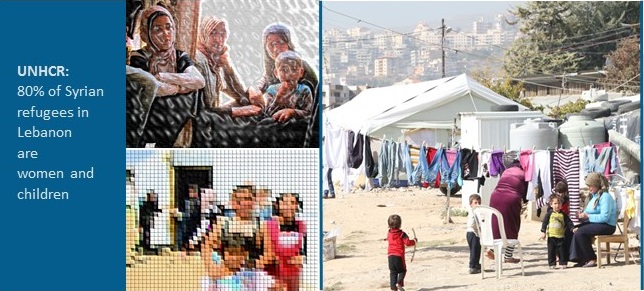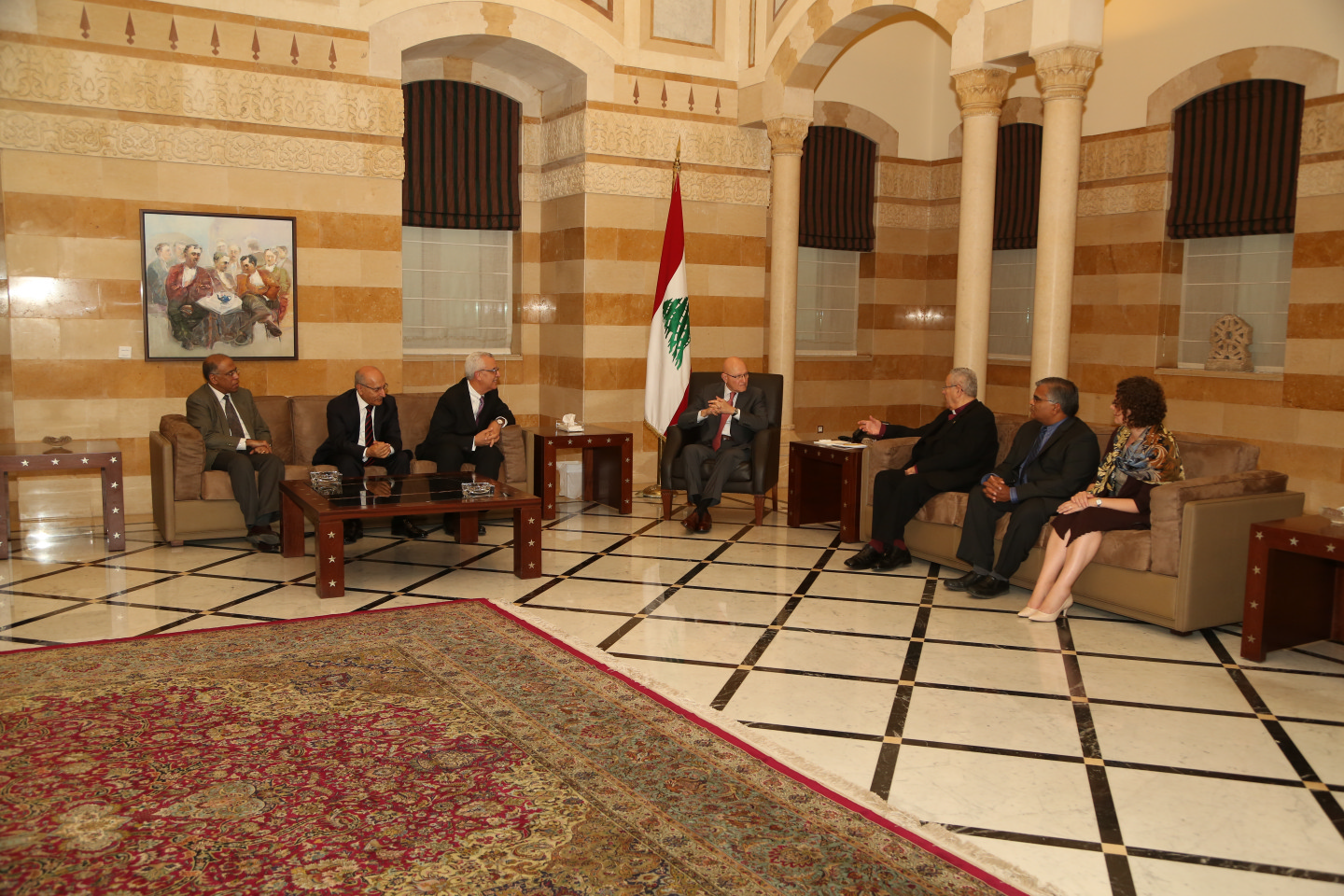LSESD's Relief Consultation
LSESD's Relief Consultation
The Syrian conflict is the biggest humanitarian disaster the world has faced since the Rwandan genocide in 1994. How are governments and the international community responding to the massive need of those fleeing the violence? What are Christian agencies and churches doing to help? Is there more that can be done?

From 9 to 11 November 2014, (Lebanese Society for Education and Social Development (LSESD) invited its supporter partners around the world to Lebanon for the first ever LSESD Relief Consultation on Syria. The consultation attendees were briefed on the present needs of Syrians in Syria, Lebanon and Jordan, how these needs were being met and where there was need for support. This was done by various bodies involved in the response to the refugee situation including the United Nations, the Lebanese parliament and Ministry of Education, the UK Government, Christian organisations and churches. The aim of the consultation was not only to get a greater understanding of the refugee situation but also for LSESD and its partners to reflect on what to do next to help Syrians as the crisis continues. The participants heard as well from an LSESD partner in Iraq about the situation of IDPs there.
LSESD’s Executive Director Dr. Nabil Costa welcomed partners in the opening session and explained the purpose of the consultation. “This crisis is now of epidemic proportions,” he said. “It is expanding and affecting not only Lebanon but other countries in the region as well. It is anyone’s guess to how it will unfold and what the future looks like. We felt it was important for us as LSESD to stop for a few days and to listen to how different people and organisations see and understand what is happening. I am so thankful both to those who shared and to our partners who came to Lebanon to get a more realistic view of the refugee crisis. Their support in what we at LSESD do next to respond to this massive humanitarian crisis is vital”.
The first speaker was Ms. Amanda McLoughlin from the British Embassy, representing the Department for Finance and International Development (DFID) in Lebanon, who explained the UK government’s strategy in the country. “We want to help Lebanon remain stable and to help Lebanon help the refugees,” she said.
“Everyone has a strong vested interest in not letting Lebanon fall back into conflict.”
DFID is spending over £140 million in Lebanon, working with 15 partners on various projects including contributing towards the provision of food for refugees through the World Food Programme, supporting the public health system, paying for textbooks for 6 to 15 year olds in public education and helping the 20 municipalities that have been most affected by the settlement of refugees.
Ms. McLoughlin was followed by Deputy Ibrahim Kanaan, an MP for the Free Patriotic Movement, the largest party in the Christian half of the Lebanese parliament, who explained the challenging political backdrop the refugee crisis is taking place against. He highlighted the strain that the conflict was having on Lebanon and how, with up to 2 million refugees now living in the country, it could not go on for much longer. MP Kanaan suggested that safe areas should be created within Syria for the displaced to stay. “The solution is that they [Syrians] have to go back because we cannot bear the consequences,” he said. “It is definitely not a programme of integration within the Lebanese society. This would mean Lebanon would be dead in less than two years.”
The second day of the consultation opened with an invocation by the President of the Supreme Council of the Evangelical Community in Syria and Lebanon, Rev. Dr. Salim Sahiouny.
Mr. Jean Marie Garelli of UNCHR then gave statistical evidence of the scale of the refugee situation in Lebanon (see box in next column) and how, due to limited resources and the huge numbers coming from Syria, they are only able to help the most vulnerable. “When you have more than one million people to take care of in a country, there’s no way you can take care of everyone,” he said. “It is impossible and it is not sustainable, despite all the generosity from the donors.”
Mr. Fadi Yadak, the Director General for the Ministry of Education, supported by Mr. Mark Todd, Senior Education Advisor for UNICEF in Lebanon, explained how the Ministry was trying to help as many students as they could get the best education possible in the public sector through their plan called RACE – Reach all children with education.
Voices from Syria
Christian agencies and churches then outlined their response to the refugee crisis. Mrs. Rosangela Jarjour, General Secretary of the Fellowship of Evangelical Churches in the Middle East, challenged all present to do more for the desperate 10.8 million Syrians requiring humanitarian relief who are still living in Syria. “I stand here powerless against the gravity of the Syrian crisis,” she said. “But I am also a witness that more can be done to alleviate the suffering and the pain of millions of vulnerable families, millions of women and children who are victims of a crisis they have no hand in creating…most of whom feel abandoned by their fellow humans.
“Forgive me for being frank, but those people for me personally are my family, my children and I cannot bear witnessing their agony and their humiliation… It’s time to act. If you don’t act now, history will condemn you.”
Mrs. Jarjour was followed by a pastor who had travelled from Syria to be at the consultation. He spoke about what his church is doing, supported by LSESD, to help 2,000 displaced families by providing food and educational, psychological and medical care. “I think Satan is visiting Syria and has stayed too long. That is why the loss is so great,” he said. “Today the whole world is fighting inside Syria and the Church is required to find a solution… We need your help because there is a lot of work and we will all be blessed because of this work.”
Voices from Jordan and Iraq
Mrs. Vera Haddad, Partnership Coordinator at the Jordanian Evangelical Community for Relief and Development shared how the situation was affecting Jordan where they too have over a million Syrian refugees. She was followed by an Iraqi Baptist pastor who told the consultation about how his church in Baghdad were now starting to help refugees affected by the rise of ISIL in the north east of Iraq. “I believe the role of the Church is to be the Good Samaritan,” he said.
Project Visit
The final day of the consultation included a trip to the Bekaa valley to see how an LSESD partner church was helping Syrians by providing food parcels and starting a school for over 260 children up to grade 7 level.
LSESD partners got to see where some of the Syrians are now living such as chicken farm buildings and shelters built in fields and vineyards.
 Visit to the Prime Minister
Visit to the Prime Minister
The group visited the Prime Minister of the Republic of Lebanon, Mr. Tammam Salam, on their return to Beirut, who thanked LSESD partners for their support for the country at this difficult time.
Recommendations
The three-day event concluded with a discussion on what people felt were the lessons from the consultation and how they should affect how LSESD and its partners move forward in their response to the Syrian crisis.
Recommendations included considering various scenarios on what could happen next and how LSESD would react in each situation, to not forget the impact of vulnerable Lebanese families at this time and to focus on the areas where LSESD has expertise, such as education, supporting children and helping those with special needs and learning difficulties.
Mr. Peter Howard, from LSESD partner Food for the Hungry, was greatly encouraged by the consultation. “It has been an opportunity to meet with the global body of Christ as we come together around what is clearly the world's largest humanitarian crisis,” he said, “to come alongside the suffering Church in the Middle East and support them through the ministry of LSESD and to see how we can both strengthen the church based response, which I am incredibly excited about.”
New LSESD Community Development Director Mr. Lucas Shindeldecker felt that the consultation had been worthwhile for both LSESD and its partners. “It was really good for partners to meet each other, to demonstrate our willingness to share and be transparent,” he said. “I think it communicated an awful lot about who we are as an organisation and what our capacities are, which will hopefully be useful for our partners going forward as they are better able to coordinate with each other as well as helping us help others."
This story first appeared on the website of LSESD and is used with permission.
Photos: LSESD